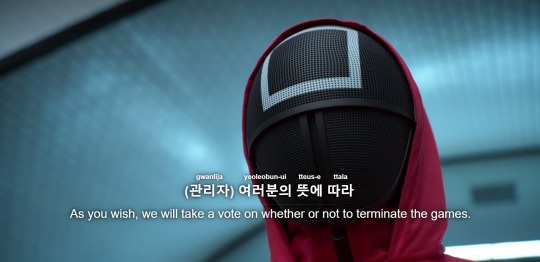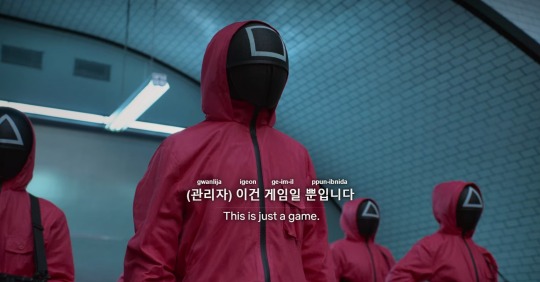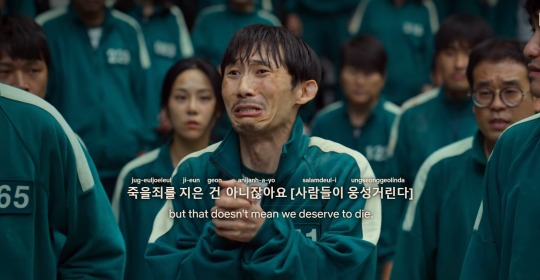#squid game analysis

따라(서)
This form is the combination of the verb 따르다 (to follow) and the simple clause connecting form 아/어(서) which we covered a little while ago. As you may remember, when a word ends in the vowel 으, the following conjugation depends on the preceding vowel. If the preceding vowel is 아, then the 아(서) conjugation is used. For any other preceding vowel, 어(서) is used. Given that 따르다 has the preceding vowel 아, it is conjugated to 따라(서).
This form can be used in a sentence to connect 따르다 to another verb, for example, 따라 가다 (to follow someone who is going somewhere).

에 따라(서)
When 에 is added to this form, the meaning changes. The typical formulation of this form in a sentence is N + 에 따라(서) + A, and it’s used to say that in accordance with N, V happens. Here are some examples of how this may be used:
According to the directions, we should go that way.
길안내에 따라서 우리는 저 쪽으로 가 야 돼요.
People should act in accordance with the culture of a country.
사람들은 그 나라의 문화에 따라 행동을 해 야 돼요.
If we understand 에 따라(서) to mean ‘in accordance with,’ we can then figure out the meaning of the Game Administrator’s statement, 여러분의 뜻에 따라 게임의 중단 여부를 투표하겠습니다. He is saying ‘in accordance with your wishes (뜻에 따라), we will take a vote to decide whether or not the game will end.
We can also understand the Game Administrator’s next statement. He says ‘참가자 한 명당 걸려 있는 상금 액수 1억 따라서 255억의 상금이 돼지 저금통에 적립되었습니다’. The first clause means ‘for every player, the amount of money at stake was 1억,’ and the second means ‘225억 has been collected into the piggy bank’. If 따르다 connects these two clauses, then we can come to the conclusion that the full sentence must translate to ‘Following (the rule) that for every player, the amount of money at stake was 1억, 255억 has been accumulated in the piggy bank’.

게 하다 and 시키다
Some of you may remember that not too long ago, we looked at the verb 시키다, which means ‘to order’ in the sense of ordering food or ordering something online. When used as a grammar form, 시키다 is added onto the verb or adjective stem to indicate that someone is being forced to do that action.
The grammar form 게 하다 which we’ll be looking at today has an identical meaning to 시키다, but also has some further usages. Sometimes, the words can be switched out for each other, although in other circumstances there needs to be a slight alteration to ensure that they’re naturalised into a sentence, given that technically 시키다 is a verb, whereas 게 하다 is solely a grammar form. Let’s take these two sentences:
The teacher made the students study during the afterschool class.
선생님은 삭생들을 방과후 수업 시간 동안 공부시켰어요.
선생님은 삭생들을 방과후 수업 시간 동안 공부하게 했어요.
My mom made me clean my room.
엄마가 나에게 방 청소를 시켰어.
엄마가 날 방 청소하게 했어.
In the first sentence, the two forms are interchangeable, however, since the second form uses a verb which is directed at someone, it uses 에게 in this circumstance. Think of it as ‘my mom made me clean my room’ (게 하다) and ‘my mom said to me that I need to clean my room’ (시키다).

게 하다 and 게 해 주다
Aside from the meaning of making something happen, 게 하다 also carries the meaning of letting something happen. When using this grammar, there is no clear distinction between which meaning is being used, so you need to be aware of context within a situation to determine whether the speaker means ‘make’ or ‘let’. Here are some examples:
My parents won’t let me go outside late at night.
부모님은 제가 밤늦게 못 나가게 하셨어요.
I will let him sleep.
저는 그를 자게 할 거예요.
If the action that is taking place is also beneficial for the person who is being allowed or made to do something, 주다 can be added to the form.
My mom made my dad give up smoking.
엄마가 아빠에게 담배를 끊게 하졌어요.
I let the students study.
저는 학생들을 공부하게 해 주었어요.
This is the usage that is being used in the example by Sang-Woo. By adding 게 하다 to the verb 투표를 하다, he is asking them to let the players vote. There are a number of nuances added to this phrase: 주다 shows that the players would benefit from it, 시 is added for formality, and 죠 indicates that since it’s within the contract that they can vote to leave, the Game Administrator knows that he has to allow it.

A note on the usage of (이)라고
Although we’ve already covered the quoting grammar form in our translation of 식샤를 합시다 2, I want to make a quick note on the usage of it in this scene, as the usage is a little different.
As we’ve already covered, (이)라고 하다 is the noun quoting form, combining 이다 and the regular quoting form 다고 하다. For example:
He said that he was a doctor.
그가 의사라고 했어요.
If you already understand this form, you may still be confused listening to the players in this scene. Player 066 says ‘그럼 당신들도 끝장이라고!’ which technically could translate to ‘I said that you’re done for then!’ however, this player hasn’t mentioned 끝장 (an unfortunate end) or anything similar before this point. How can he be quoting something he hasn’t said?
Here’s the thing, 이라고 can be used when you’re saying something again, but can also be used when you’re trying to strongly express something that was already obvious in your previous statement. Previously, player 066 tells the guards ‘우리 안 풀어 주면 핸드폰 위치 추적이라도 해서 여기로 찾아올 거야!’ (If you don’t let us go, the police will track down this place using the GPS on our phones!). Although he hasn’t specifically stated that they’ll be finished, it’s obvious in what he is saying. Using (이)라고 simply emphasises this last point based on the prior information.
Honestly, in my opinion this usage is a nuisance since it’s a little difficult to use as a non-native speaker. There’s no real equivalent in English so it’s difficult to understand when to use it, and it’s a fairly uncommon grammar form to use too. The best thing to do is just keep this nuance in mind and look out for examples to refresh your memory.

뿐이다
뿐 is a particle which can be attached to a noun to say ‘just’ or ‘only’. This is very similar to the particle 만, which has the same meaning. There is no real difference between the two, and they can mostly be interchanged, but the sentence must change to accommodate the grammar rules of each particle.
만 can be used in place of the topic or subject marker that would usually follow a noun, and can be used with verbs which are turned into nouns. 뿐 can only be used at the end of a sentence with 이다 attached to it, and can only be used with nouns. This sentence uses a regular noun, and can be changed to use either form:
He only likes movies.
그는 영화만좋아해요.
그가 좋아하는 것은 영화뿐이에요.
This sentence uses the nominalised form, where a verb is changed into a noun. Because of this, there is no way to use 뿐 in this sentence.
If you only go to class, you’ll be able to graduate.
매일 수업에 가기만 하면 졸업할 수 있을 거예요.

뿐만 아니라
With the addition of 아니라, this form negates the singularity created by 뿐 in the sentence. It is used in a sentence with the structure N + 뿐만 아니라 + N(도), and translates to ‘not only N, but N as well’.
Not only did I buy coffee, I also bought snacks.
커피뿐만 아니라 간식도 샀어요.
I didn’t just buy my things, but the things my friend needed too.
내것뿐 아니라 내 친구것도 샀어요

ㄹ/을 뿐
Including the object marker before 뿐 creates a slightly different meaning. Although it is a very small difference in spelling, the nuance is very different. This version carries the meaning that there in nothing special about the thing which 뿐 is describing. This usage essentially minimises what is being said.
I just put a bit of water in it, why are you so mad? It’s only ramen…
불을 조금 넣었다고 화를 이렇게 많이 내? 그냥 라면일 뿐이야…
It’s just a joke.
그것은 농담일 뿐이에요.
Buying this is just a waste of money.
그것을 사는섯은 돈 낭비일 뿐이에요.
This is the form which the Game Administrator is using in this scene. By saying ‘이건 게임일 뿐입니다’ (this is just a game), he is trying to minimise the situation. To both him and the VIPs, the Squid Game is truly just a game for entertainment. The players rightfully object to this, saying ‘사람을 그렇게 죽여 놓고 게임이라고요?’ (people just died like that and you’re saying it’s only a game?!). Obviously, as potential victims of the game, the Administrator’s attempt to minimise the situation is ridiculous.
One final thing to note about this form is that whilst the object particle is used to add this nuance, it is also used with the past tense form of 뿐. This can cause confusion as to whether the original form or the nuanced form is being used. In this case, you will have to use context clues to determine how 뿐 is being used in the situation.

There are many translations within Squid Game which don’t do justice to the original script, and this is one of the most significant for me. After the first game, where the players have realised that losing the game results in their death, player 271 steps forward and pleas ‘우리가 빚을 졌지, 죽을죄를 지은 건 아니잖아요!’ There are two significant phrases here, the first being 빚을 지다 (to be in debt), and the other 죽을 죄를 지었습니다, which has many connotations attached to it.
Firstly, focusing on 죽을 죄를 지었습니다, this is likely a phrase which you have heard before even if you don’t recognise it. 죽을 죄 means unforgiveable sin/crime, and 지었습니다 means to commit. This is a common phrase in historical dramas where someone has to bow down to a member of the royal family or a army general to express their guilt at their actions in the hope of a lenient sentence (even if they’ve done nothing wrong). Someone of a lower class or place within society may also be forced to say it by someone above them as a way to demonstrate power and ‘put them in their place’.
If we look at the phrase as a whole, then, we have ‘yes, we’re in debt, but we haven’t committed some unforgiveable sin/crime. You know that.’ Whilst the translation in the subtitle is similar (we may be in debt, but that doesn’t mean we deserve to die), I feel that this translation points more towards the games being unfair and immoral, rather than the writers’ intention of highlighting the players as good people. Yes, some of the players, such as Jang Deok-su have committed crimes, and are in debt due to their own immoral lifestyles, but many are just unfortunate victims of an unjust society. Seong Gi-hun is an example of this. His character provides a reference to the real-life 2009 Ssangyong Motor strike, where nearly 2,600 workers who occupied the plant for seventy-seven days to protest layoffs were violently beaten down by police. Many of these protestors went to jail, which may be the reason that Gi-hun struggles to find and hold down a good job. As a result, he is desperate for money, especially since he wants to give his daughter expensive gifts. He gambles, and this causes his debt. Ultimately, Gi-hun did nothing wrong. He is a victim of his circumstances, and this is what the writers wanted to highlight - that almost all of the players are unfortunate victims of society, who are victimised yet again through the games. Therefore, ‘we haven’t committed some unforgiveable crime/sin’ is much more fitting to me, even if it isn’t a very natural phrase in English. Maybe the subtitle translator should have gone with something like ‘yes, we’re in debt, but we were pushed into it through no fault of our own. Does that really mean that we deserve to die?’. This highlights the innocence of the players much more.
Themes of unjust society, and the widening of the income gap are incredibly important to Squid Game’s narrative. Some great articles to read to learn more about these themes can be found here:
❥Squid Game lays bare South Korea’s real-life personal debt crisis
https://www.theguardian.com/world/2021/oct/08/squid-game-lays-bare-south-koreas-real-life-personal-debt-crisis
❥Squid Game’s Strike Flashbacks Were Modeled on Our Real-Life Factory Occupation
https://jacobinmag.com/2021/11/squid-game-ssangyong-dragon-motor-strike-south-korea

All of these particles can be used to show that something is being done or given to someone. The difference between these three particles is:
❥ 에게 is used mainly in written communication or formal situations (although it may also be used conversationally sometimes).
❥ 한테 is used mainly in conversation.
❥ 께 is used when talking to or about someone who requires respect (eg. elder/teacher/boss).
These particles come after the recipient, rather than before as they do in English. Here are some examples of their usage:
I gave a present to my friend yesterday.
어제 친구에게 선물을 줬어요.
I send a birthday card to my friend every year.
저는 매년 언니에게 생일 카드를 보냅니다.
My friend gives a watch to their boyfriend.
동생이 남친한테 시계를 줘요.
I want to ask (to) my friend.
저는 친구한테 물어보고 싶어요.
I call (to) my grandma.
할머니께 전화 드려요.
I will give this book to my teacher.
이 잭이 선생님께 드릴 거예요.
Something that is important to note with this grammar is that although it means ‘to’, it can also be used to mean ‘from’. Obviously, this can be confusing, and it can be difficult for learners to figure out how to use this in conversation. When listening to others, however, you can understand which meaning is intended by the context. By listening to native speakers, it becomes easier to understand and use this grammar.
By analysing the Game Administrator’s words, we can grasp which version he is intending to use. He begins with 다시 말씀드리지만 (let me explain again), then states 여러분에게 기회를 드리는 겁니다 or 여러분에게(to you)기회를(an opportunity)드리는(to give) 것입니다(this is). By context, we can understand that he is using the ‘to’ usage. He is saying to the players ‘we are giving you an opportunity’ or ‘this is an opportunity’ with an emphasis on the charitable aspect. Here, 에게 is being used instead of 한테 to indicate the formality of the situation, even though it is being used in spoken conversation.
In this scene, I find that the translation is a little off. ‘Let me remind you’ comes off as passive aggressive and indicates a kind of hostility towards the players which I feel isn’t present in the Korean version. The Game Administrator is still using honorifics, and although his tone is always cold, he actually speaks very politely towards the players. I feel like this would have been translated better as ‘please understand, we are giving you an opportunity’, as this carries the same tone as the Korean version, although it strays slightly from the exact meaning.

거든(요) in a second clause
This grammar principle is placed at the end of a clause to indicate the reason for something or provide an explanation. Most of the time, you’ll see 거든(요) used at the end of a fragment or incomplete sentence as a tag on explanation to what has previously been said. Here are some examples of this:
These days, I go to bed too late. It’s because I have so much work.
저는 요즘에 너무 늦게 자요. 일이 많거든요.
Come to our house this Friday night. We moved house recently (so we’re having a party).
이번 주 금요일에 우리 집에 저녁 드시러오세요. 얼마 전에 새집으로 이사했거든요.
Will you come to our house for dinner tomorrow? It’s my birthday.
내일 저희 집에서 식사 함께 하실래요? 내일이 제 생일이거든요.
It is also possible to use 거든(요) in full sentences, like so:
It’s because if I get the chance, I’d like to try working at a Korean company in the future.
나중에 기회가 되면 한국 회사에서 일해 보고 싶거든요.

거든(요) in a first clause
거든(요) has a slightly different meaning when used in the first clause instead of the second clause of an explanation. If used at the end of the first clause, 거든(요) indicates that you are providing information which will help the listener to make sense of the next clause. Here are some examples of how this can be used:
I haven’t done the work yet, so I’ll probably have to go to the office to do it.
일을 아직 안 했거든요. 그래서 오늘 회사에 사거 해야 될 것 같아요.
I marked it in our calendar. Don’t forget, and make sure that you come on the day.
우리가 언제 달력에 표시했거든요. 깜빡하지 말고 그 날에 꼭 와야 돼요.
This is the way in which Han Mi-Nyeo uses 거든(요). She is telling the Game Administrator that she has a baby to allow her to then explain that she hasn’t named it yet so she couldn’t register the birth of her baby. This is one of the first scenes that hints towards Han Mi-Nyeo’s intelligence and manipulative abilities. She most likely doesn’t have a baby, but pleads desperately with the Game Administrator to let her go to be with her child. This is very smart, considering that Korea has a very low birth rate. The rarity of children has caused people to value them a lot, and you will often find people trying to interact with childrenandgiving them freebies like sweets or yakult drinks wherever they go. In normal circumstances, Mi-Nyeo would have been sent away immediately.
